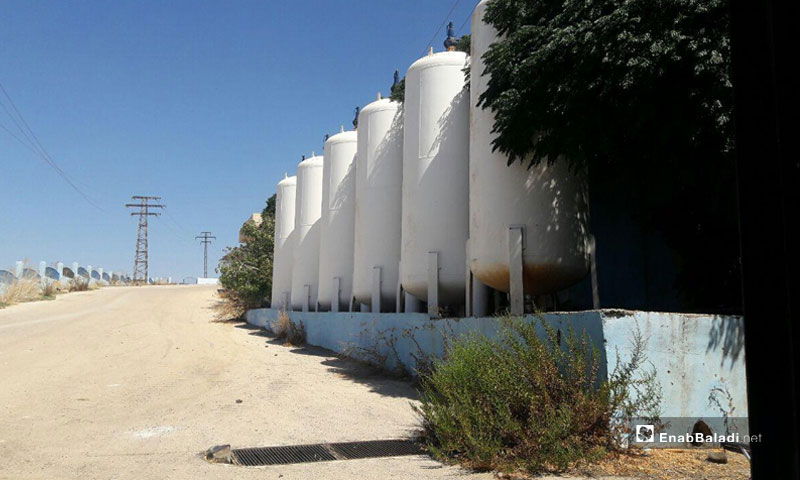The depletion of Zayzun lake caused a severe shortage of drinking water in the towns of Zayzun, al-Jaraa and Amouriya in the western countryside of Daraa. Therefore, the Water Supply Institute of Daraa proceeded to provide these towns with drinking water through drawing water from the springs of Ayoun al-Abd using pipelines.
The water extraction plan has been implemented; however, the amount of water delivered did not meet the needs of all involved towns, for the pipelines do not reach the main water reservoirs, not to mention the dilapidated condition of the water supply network.
The Syrian regime’s official media outlets reported the details of the project, which is supposed to address the water crisis in the area, focusing on the workload and how close the project is to achieve the desired outcomes.
Enab Baladi interviewed three sources in Daraa, who, refusing to be named for security reasons, agreed that the project demands sufficient investment to be up to expectations in terms of benefits; they also expressed pessimism about the project’s ability at resolving the water crisis in the area.
In progress
On September 3, the Syrian News Channel (Al-Ikhbariyah Syria), affiliated with the Syrian regime, quoted the Director of Water Resources in Daraa province, Mohammed Munir al-Odeh, as saying that the desiccation of the lakes Zayzun and Mezireb in the countryside of Daraa, resulted from the indiscriminate drawing of groundwater from 7,000 wells, effected a water crisis in the area.
This crisis prompted the Water Supply Institute of Daraa to start implementing a project for drawing drinking water from the springs of Ayoun Al-Abd in al Ajmi town, to provide the towns of the western Daraa countryside with the potable water they are in need of.
The Co-Director of the Water Supply Institute, Daraa province, engineer Riyad Musalema told Al-Ikhbariyah Syria that the water extraction from the springs of Ayoun al-Abd was at 4.5 km long while it is expected to feed four areas in the western countryside of the Daraa province.
The fifty years old Abu Ahmad, a resident of the Zayzon town, told Enab Baladi that the water coming from the springs of Ayoun al-Abd is enough [to meet the shortage], but it is not invested properly.
Besides, Abu Ahmad asked the Water Unit in the town to control violations and infringements against the water lines, as well as supply the main reservoirs with water, for maintaining a positive pressure of water to ensure that water will reach the largest number of beneficiaries.
Ongoing problem
The sources that Enab Baladi interviewed said that the project addressed the problem of drinking water shortage partially. However, further steps need to be taken which might be costly. According to an agricultural engineer residing in the western countryside of Daraa, to maximize the benefit of water drawing, water should be delivered to the main reservoirs so that the high and remote areas from the water network can also get the service.
“This is not currently applied, for the water is distributed directly through water network, which prevents water access to all areas,” the engineer added, pointing out that the network is very old and in need of near-complete restoration.
Despite the importance of the project and its being a necessity to provide the area with water, for now it can only support the areas near the Vanguard Camps, as the engineer stated.
Depletion of water primary source
With the depletion of Lake Zayzon, the area lacked its major source of drinking water as the farmer Abu Firas, from Amouriya town, emphasized to Enab Baladi, driving people to rely on well-water which contains a high level of lime.
In addition, the residents of the area resorted to buying water tanks which “cost too much, for a single tank’s price is five thousand Syrian pounds; yet, it is very hard to get one,” Abu Firas pointed out.
Lake Zayzon used to provide drinking water to the towns of Zayzoun, al-Jaara, and Amouriya, in addition to the Vanguard of the Ba’ath Camp, which is currently considered the main post of the 4th Division of the Syrian regime army.
The depletion of Lake Zayzon is primarily caused by the excessive demand of water for irrigating lands in the summer. However, the agricultural engineer that Enab Baladi interviewed anticipates the lake to refill by rains during the winter.

